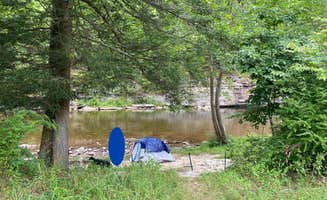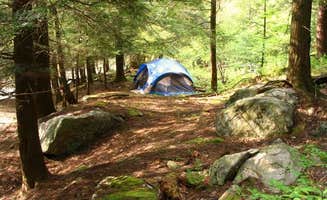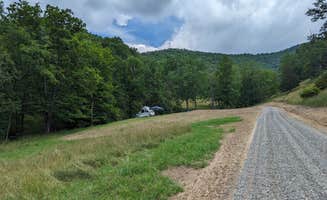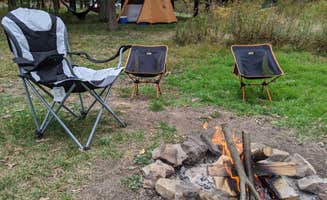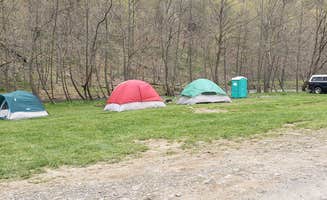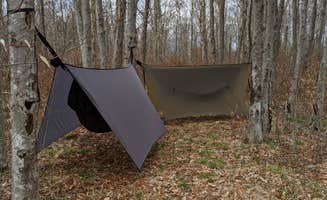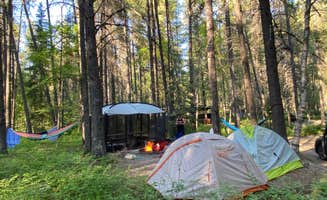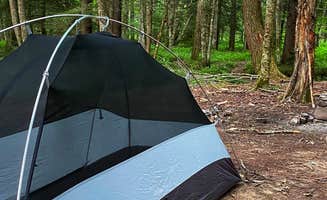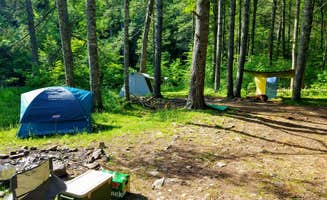Tent camping near Thomas, West Virginia places visitors in mountainous terrain at elevations between 2,500-4,000 feet within the Monongahela National Forest. The surrounding area experiences frequent fog and mist that contributes to its rich plant diversity, particularly ferns, mosses, and fungi. Summer temperatures typically range from 75-85°F during days but can drop to the 50s at night, requiring campers to pack warmer sleeping gear even during summer months.
What to do
Creekside exploration: Several camping areas feature adjacent streams that provide natural recreation spots. At Little River Dispersed Campsites, a camper mentioned "When you park and walk down to the river, if you turn right, there's a beach area about 50 yards down that offers a great spot to take a dip!" The creek features small swimming holes and natural pools perfect for cooling off.
Bouldering and rock features: Rock formations near campsites provide natural climbing and exploration opportunities without technical equipment. At Bear Heaven Campground, "Right beside the camp ground is a really cool area to explore unique boulders and rock structures. You can either walk through or climb these boulders." The area also connects to mountain biking trails for more adventure options.
Wildlife observation: Early mornings and dusk offer prime wildlife viewing times in the forests around Thomas. According to one camper at Little River, "Not even 2 minutes from our dispersed camp site we were charged by an extremely aggressive black bear." This highlights the importance of proper food storage and wildlife awareness when camping in this region.
What campers like
Secluded riverside sites: Many campers appreciate the privacy and natural soundscape of waterside locations. At Eagle Rock Campground, one visitor reported "Stayed one night in a tent right next to the river. It is what it is, a West Virginia backwoods campground. $10 will get ya a nights stay." The combination of affordability and natural setting makes these sites particularly appealing.
Off-grid experience: The remote nature of many campsites provides a true escape from connectivity. A camper at Lost Land Run noted, "This place is a great place if you're looking for a totally off the grid weekend. Due to location in-between the tall mountains there is absolutely No CELLPHONE SRRVICE past the first couple campsites." This isolation creates a genuine wilderness experience within driving distance of urban areas.
Natural features: The region's topography creates unique camping environments. At Little River Dispersed Campsites, a camper described their experience: "Little river has about 15 campsites along Little River Road. Most are decent, but a few are absolutely gorgeous... There's a couple fire rings up by the parking spot, but we chose to set up a little closer to the creek."
What you should know
Access challenges: Many primitive sites require navigation of rough roads that can be problematic during wet conditions. At Little River Dispersed Campsites, a visitor warned, "the road is narrow and you'll need to pull off to the side to let cars pass coming in, and the road is riddled with pot holes and is entirely gravel." Plan your vehicle choice accordingly, especially during spring thaw or after heavy rains.
Limited facilities: Most tent camping options near Thomas operate with minimal amenities. At Barnum Whitewater Area, "Primitive campsites are $10 a night. Small cabins are $35 a night, with larger cabins going at $56 a night. There is electricity in the cabins." However, most tent sites have only basic facilities, if any.
Weather variability: The mountain location means conditions can change rapidly. A camper at Big Run State Park noted, "Mosquitos are something of an issue, but by no means awful; and it is a pleasure to sleep in nature with nothing but birdsong and the sound of the rushing creek." Pack appropriate insect protection and weather gear for unexpected changes.
Tips for camping with families
Choose sites with natural play features: Streams provide natural entertainment for children. At Big Run State Park Campground, one visitor shared: "Used lot 73 for a 26ft hybrid camper. Fit perfectly! It was flat, large, clean and right by the creek. The kids loved playing in the water." The accessible water features keep children engaged without need for electronics.
Check trail difficulty ratings: Not all hiking paths are suitable for younger explorers. A local at Lost Land Run cautioned, "it is not recommended for beginners or small children as it is very Rocky, slippery, with too much potential for a serious injury with inexperienced people." Research trail conditions before bringing children on longer hikes.
Consider group camping options: For family reunions or multi-family trips, dedicated group sites offer more space. At Gatewood Group, a visitor reported, "This is a great spot for a large group. Very spacious with two vault toilets. We were able to find quite a few nice hammock spots in the trees if that's your preferred camping method."
Tips from RVers
Size limitations: The narrow access roads and small campsites restrict larger recreational vehicles. At Eagle Rock Campground, sites are described as "grassy, not clearly delineated, and line the river bank. Find a spot and set up." This informal arrangement works better for smaller RVs and vans rather than large motorhomes.
Limited hookups: Most camping areas near Thomas lack traditional RV services. While Big Run State Park accommodates some RVs, a camper notes there are "campsites with amenities, near water and bathrooms, but not all of them have the amenities." RVers should be prepared to dry camp without electrical or water connections at most locations.
Alternative accommodations: For RVers wanting more comfort, some areas offer cabin options. Abrams Creek Campground provides cabins that one visitor described as having "electric service, a microwave, electric heater, refrigerator and lights." These alternatives offer a compromise between tent camping and full RV camping.


